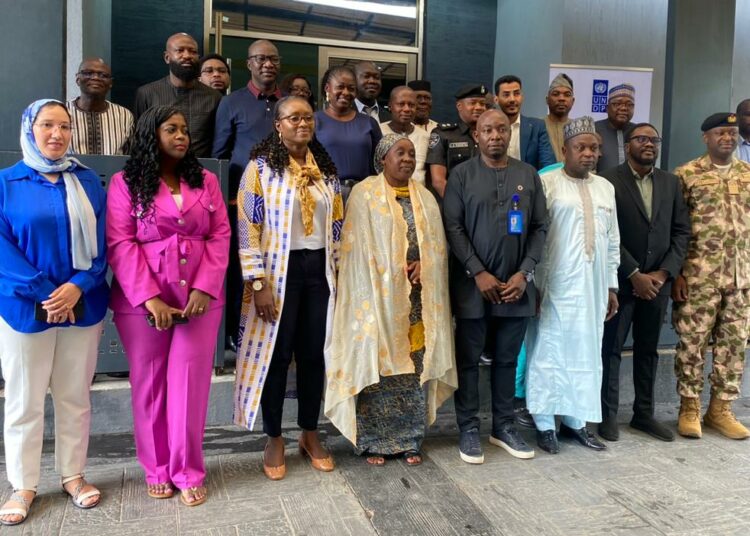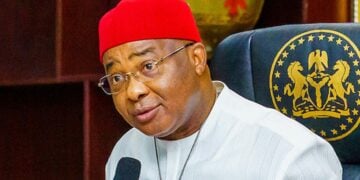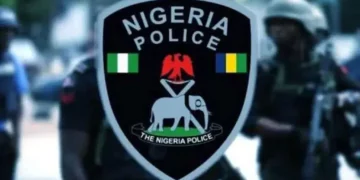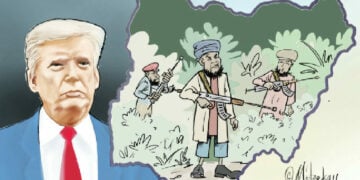The United Nations Development Programme (UNDP) has emphasised the need for better coordination between military and civilian to improve humanitarian access and support civilian-led stabilisation in conflict zones.
The Resident Representative of UNDP in Nigeria, Elise Attafuah, gave the charge at the opening ceremony of a regional workshop for security force liaison officers, monitoring & evaluation staff on conflict sensitivity and inclusive security on Monday, in Abuja.
The workshop, which was organised by UNDP aimed at reflecting on civil-military engagement experiences in stabilisation programming within the Lake Chad Basin and Liptako-Gourma programmes.
Attafuah, represented by Blessed Chimuruta, the deputy director of Operations at UNDP in Nigeria, emphasised that successful stabilisation cannot be achieved solely through security measures.
“Over the next three days, we are embarking on a journey of reflection and learning, examining our civil-military engagement over the past five years.
“This workshop presents a unique opportunity to accept how we engage with local, national, and regional security forces, to support communities where we implement stabilisation programmes.
“By sharing our experiences and best practices, we aim to improve our approach and avoid passing states.”
The Regional Conflict Sensitivity Adviser for UNDP Millicent Lewis Ojumu, articulated the intricate nature of the initiative and the key role of security force liaison officers in facilitating community engagement aimed at stabilising the challenging regions.
She said, “The stabilisation programme that UNDP is developing and implementing across six countries in Lake Chad Basin and the Liptako-Gourma programme requires us to be very, very much in tune with how the situation is evolving in the communities we work.
“Our security force liaison officers are at the fore of making sure that the engagement between community members and the security forces really does work well towards stabilising these very difficult regions.
“We seek to meet here to review over the past five years that the regional stabilisation facility has been operational, review our approach, look at the lessons, look at the experiences, look at our understanding of the context, and adapt ourselves.”
She also highlighted UNDP’s collaborative approach, working in partnership with governments to ensure a minimum level of security that enables the implementation of activities to secure basic access to services.
“One of the key criteria is that there is a minimum level of security that the government can assure so that we can come in with initiatives that will enable us to implement activities that secure further basic access to basic services.
“We are also very keen to be sure that the community themselves feel empowered to take ownership of these initiatives. And so in that regard, we have been successful in the areas we have stabilized, you will find basic services in the number of the states where we’ve worked.
“Take, for example, we visited in Ngarannam community on Saturday and you’ll see the clinic is there, the community has gone back to where they had moved when they were facing attacks, and you will see their children moving around.
“So for us, that is a step in the right direction. It is not to say it is 100% the way we would like to see it but compared to where it was five years ago, we are quite satisfied that the government has taken ownership and the progress has been made and the support we give to the government in stabilizing these regions has really been worthwhile,” Ojumu added.
The Senior Technical Adviser to the Deputy Governor of Borno State, Dr. Nana Zakama, for her part, expressed gratitude to UNDP for the invitation to share thoughts towards the improvement of security in the state.
“Since the inception of the regional stabilisation in our facility, Borno has played a vital role in ensuring success, our contributions have been guided by the relentless leadership of our governor.
“The commitment of Borno to restoring peace, rebuilding communities, and sustaining development is resolute, evident, and very visible in the action of our governor.
“The governor of Borno, Babagana Zulum leads a team of dedicated staff in driving and complimenting stabilisation initiatives through strategic investment in security, livelihood, housing, health, and social welfare among others while creating a conducive environment for the return of resettlement of people in a dignified manner,” she said.
Also speaking to journalists during the event, a Monitoring and Evaluation Officer of the UNDP Nigeria, Joseph Sopade, admitted a plethora of challenges facing the UNDP, governments and other stakeholders.
He however, expressed confidence that the challenges are being surmounted.
“There are a plethora of challenges but for us as professionals, we always look forward to how we think outside the box to overcome these challenges. One of the challenges of course is the very fluid security situation and the challenges of accessing the community, the challenges of unpredictable attacks, the challenges of landmines and IEDs and of course, the people who are already traumatised who are conflict affected people who are looking for help.
“These challenges are extremely enormous but for us as UNDP with the partnership that we have established with government officials in the respective states where we work, we have been able to surmount some of these challenges. This is one of the reasons we initiated the stabilisation facility intervention for us to see the extent to which we can stabilise these communities,” Sopade said.
Yobe State’s security advisor, Gen. Dahiru Abdulsalam (retired), stated that the state has significantly contributed to the regional stability project in the Northeast.
According to him, Yobe will continue to work closely with the UNDP and other development partners that align with the state to enhance coordination and effectiveness of security measures.
“Our commitment to enhancing security, promoting human rights, and fostering community resilience has been unwavering.
“Recently, Governor Mai Mala Buni inaugurated a security planning commission, provided vehicles to our security forces, enhancing capacity and capability to maintain peace and security, and enforce control over insurgence stronghold,” Gen. Abdulsalam said.





